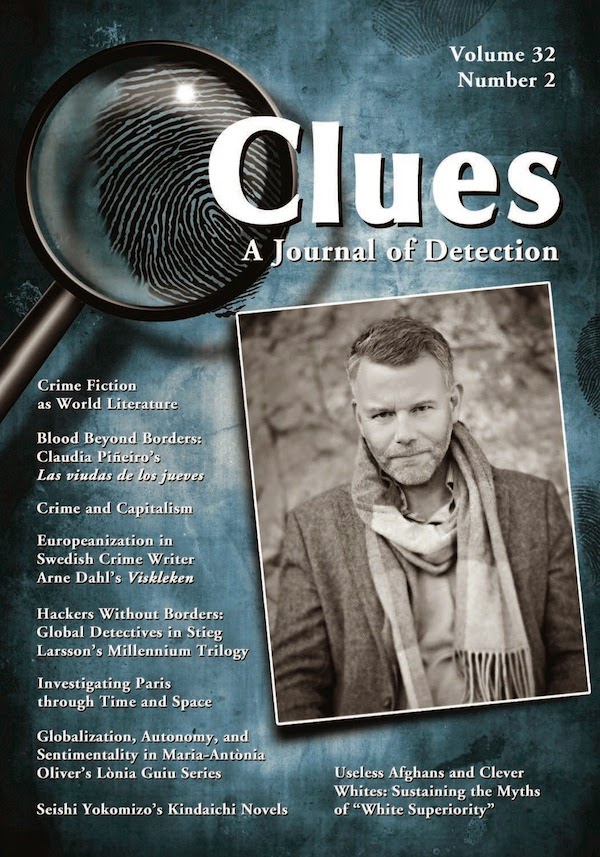Featuring History of Mystery/Detective Fiction and Other Literary Ramblings of Elizabeth Foxwell
Saturday, September 20, 2014
Clues 32.2: Global crime fiction.
Just published is vol. 32, no. 2 of Clues: A Journal of Detection—a theme issue on global crime fiction guest edited by Stewart King (Monash University) and Stephen Knight (University of Melbourne). If interested in ordering the issue or subscribing, email McFarland.
The cover features Swedish author Arne Dahl. The table of contents follows below. I will add links when available.
The Challenge of Global Crime Fiction: An Introduction
STEWART KING AND STEPHEN KNIGHT
Crime Fiction as World Literature STEWART KING
This article explores crime fiction within a world-literature framework. It argues that the study of national traditions can blind us to the dialogue across borders and languages between texts and authors. It proposes a reading practice that aims to develop a more nuanced understanding of this truly global genre.
Beyond National Allegory: Europeanization in Swedish Crime Writer Arne Dahl’s Viskleken KERSTIN BERGMAN (Lund University)
Swedish crime fiction is experiencing a strong move toward Europeanization; increasingly more novels are set in Europe and discuss European identities and transnational criminality. The author examines how national and European perspectives clash and interact in Arne Dahl’s Viskleken (Chinese Whispers, 2011), a novel featuring a multinational police team within Europol operating across borders.
Hackers Without Borders: Global Detectives in Stieg Larsson’s Millennium Trilogy NICOLE KENLEY (University of California, Davis)
The article argues that Stieg Larsson’s Millennium Trilogy is a response to the challenges of mediating digital crime. It suggests that as the technological aspects of global crime threaten to dissolve national borders, Larsson’s novels offer the computer hacker as a detective figure capable of partially managing these emerging threats.
Globalization, Autonomy, and Sentimentality in Maria-Antònia Oliver’s Lònia Guiu Series
MELISSA M. CULVER (Texas A&M University-Corpus Christi)
This article examines the roles of globalization, autonomy, and sentimentality in Maria-Antònia Oliver’s Lònia Guiu detective series. This analysis focuses on narrative effects—exploitative sexism, ubiquitous violence, the construction of autonomy, and sentimentality—to explain the shaping of a production that interrogates the relationship between global crime and local victimhood.
Crime and Capitalism: Giorgio Scerbanenco’s and Massimo Carlotto’s Italian Domestication of American Hard-Boiled Crime Fiction BARBARA PEZZOTTI (Australasian Centre for Italian Studies)
The novels of Giorgio Scerbanenco and Massimo Carlotto represent the most self-conscious meditations about the relationship between capitalism and criminality within Italian crime fiction. In the 1960s Scerbanenco pointed at the capitalistic structure of organized crime, whereas in the 1990s Carlotto showed how capitalism had assumed the typical features of the mafia.
In the Footsteps of Léo Malet: Investigating Paris Through Time and Space JEAN ANDERSON (Victoria University of Wellington)
Léo Malet’s Nouveaux mystères de Paris (1954–59) that feature wise-cracking private detective Nestor Burma have inspired writers such as Cara Black, Patrick Pécherot, Noël Simsolo, and Roland C. Wagner. The author looks at work by these Malet-influenced authors to evaluate the adjustments required to meet very different reader expectations.
Useless Afghans and Clever Whites: Sustaining the Myths of “White Superiority” in Early–Twentieth-Century Australian Crime Fiction ERIN CLARINGBOLD
This article explores how early-twentieth-century Australian crime fiction responded to the perceived economic and racial threat of the “Afghan” cameleers by acting as a literature of fantasy fulfillment wherein myths of white superiority and nation building were sustained through the cameleers’ portrayal as both “deviant and absent,” most notably manifesting in the figure of the “fake Afghan.”
Blood Beyond Borders: Claudia Piñeiro’s Las viudas de los jueves CAROLINA MIRANDA (Victoria University of Wellington)
Claudia Piñeiro’s novel rewrites the traditional locked-room mystery by relocating a crime that rattles the peace of a gated community, exposing various social ills that are, arguably, the product of the short-lived economic boom of 1990s Argentina. Furthermore, it problematizes the dialectics of “Civilization and Barbarism” in a post–-9/11 Buenos Aires.
Inheriting the Nation: Seishi Yokomizo’s Kindaichi Novels
CHIHO NAKAGAWA (Nara Women's University)
This article argues that the early Detective Kindaichi novels by Seishi Yokomizo offer an analysis of Japanese culture and society after World War II. The murders for inheritance set in the countryside assume a particular significance as an exploration of suitable inheritors of the nation after the devastating defeat of World War II.
“Every Healthy Englishman Longed to Kick Him”: Masculinity and Nationalism in Agatha Christie’s Cards on the Table
J. C. BERNTHAL (University of Exeter)
Agatha Christie’s detective fiction offers a famously self-conscious approach to topical concerns. This article considers nationalism and masculinity in Christie’s prose. Focusing on the detective Hercule Poirot as well as Cards on the Table—a tightly plotted novel with an “oriental,” sexually ambiguous victim—it explores self-conscious presentations of race and gender.
“We’re All Strangers”: Postwar Anxiety in Agatha Christie’s The Mousetrap
JESSICA GILDERSLEEVE (University of Southern Queensland)
Agatha Christie’s play, The Mousetrap, disturbs the middlebrow, middle-class conventions of Golden Age detective fiction. By introducing an explicit suspicion of personas and roles, Christie’s play points to a postwar anxiety that wartime freedom undermined the capacity for surveillance, putting citizens—especially women—at risk.
REVIEWS: Crime and Detective Fiction (ed. Rebecca Martin); Simenon and France (Bill Alder); The Gay Male Sleuth (Drewey Wayne Dunn); Troubled Daughters, Twisted Wives (ed. Sarah Weinman)
Subscribe to:
Post Comments (Atom)

No comments:
Post a Comment